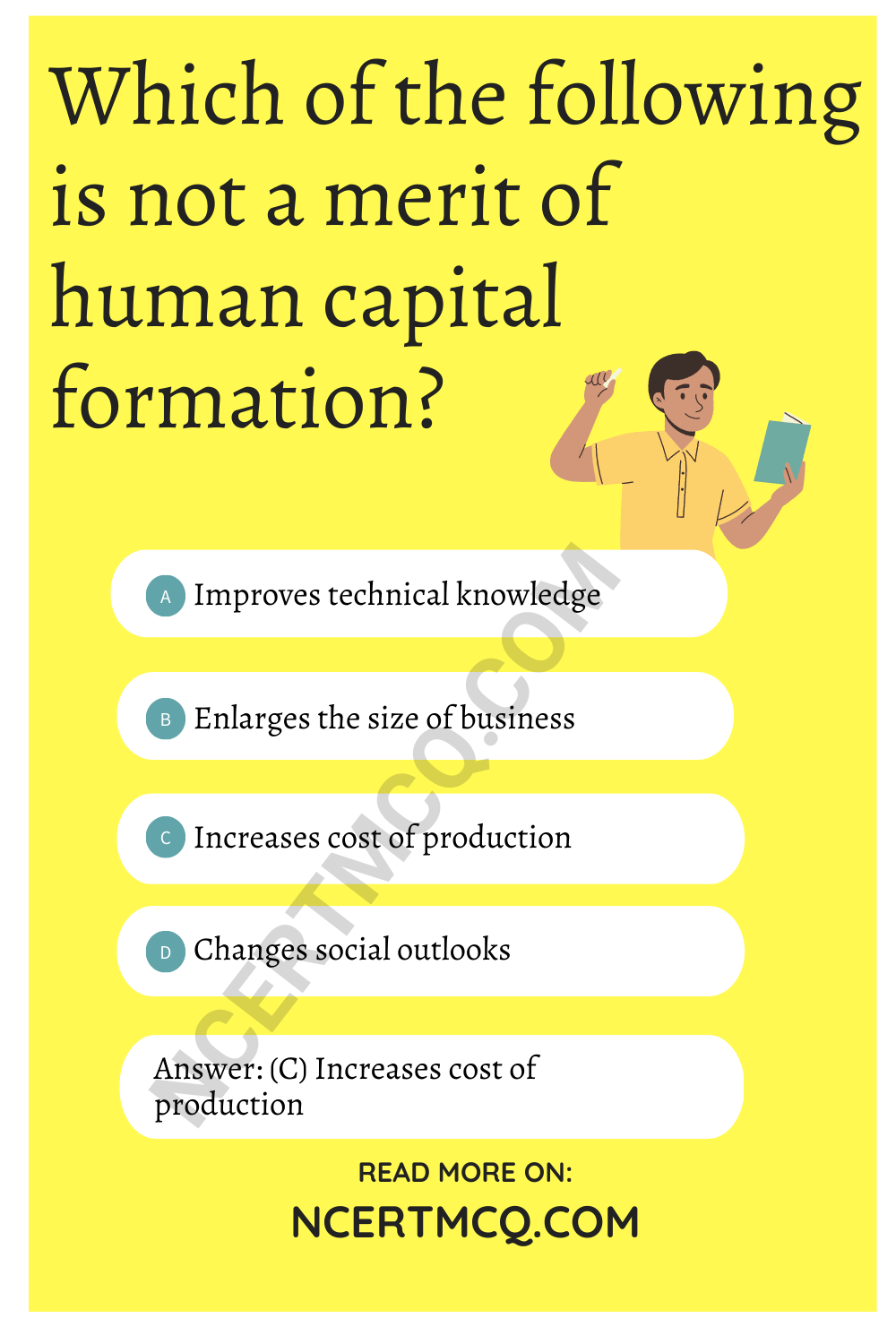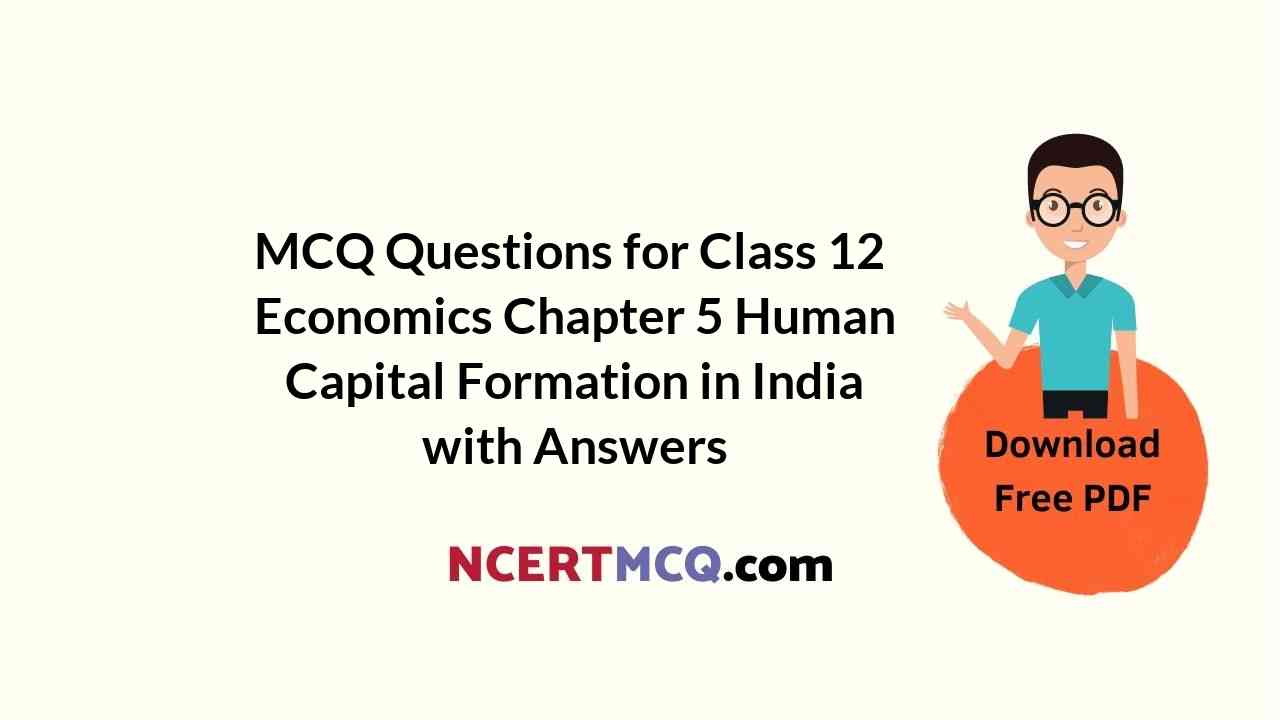Check the below NCERT MCQ Questions for Class 12 Economics Chapter 5 Human Capital Formation in India with Answers Pdf free download. MCQ Questions for Class 12 Economics with Answers were prepared based on the latest exam pattern. We have provided Human Capital Formation in India Class 12 Economics MCQs Questions with Answers to help students understand the concept very well.
Class 12 Economics Chapter 5 Human Capital Formation in India MCQ With Answers
Economics Class 12 Chapter 5 MCQs On Human Capital Formation in India
I. Choose the correct alternative.
Human Capital Formation Class 12 MCQ Question 1.
Which of the following is not a merit of human capital formation?
(A) Improves technical knowledge
(B) Enlarges the size of business
(C) Increases cost of production
(D) Changes social outlooks
Answer
Answer: (C) Increases cost of production

MCQ Of Human Capital Formation Class 12 Question 2.
Match and choose the correct combination.
| (i) Preventive medicine | (A) medical intervention during illness |
| (ii) Curative medicine | (B) vaccination |
| (iii) Social medicine | (C) the spread of health literacy |
(A) (i) – (B); (ii) – (A); (iii) – (C)
(B) (i) – (A); (ii) – (B); (iii) – (C)
(C) (i) – (C); (ii) – (B); (iii) – (A)
(D) (i) – (B); (ii) – (C); (iii) – (A)
Answer
Answer: (A) (i) – (B); (ii) – (A); (iii) – (C)
Human Capital Formation MCQ Question 3.
Which of the following is not an indicator of education level?
(A) Years of schooling
(B) Life expectancy
(C) Teacher-pupil ratio
(D) Enrollment rate
Answer
Answer: (B) Life expectancy
Human Capital Formation MCQ Class 12 Question 4.
Which of the following institutes comes under the health sector?
(A) NCERT
(B) UGC
(C) AICTE
(D) ICMR
Answer
Answer: (D) ICMR
Class 12 Human Capital Formation MCQ Question 5.
Which level of education takes a major share of total education expenditure in India?
(A) Elementary
(B) Secondary
(C) Higher
(D) Tertiary
Answer
Answer: (A) Elementary
Human Capital Formation In India Class 12 MCQ Question 6.
What was the share of education in total government expenditure in 2014?
(A) 7.92 percent
(B) 15.7 percent
(C) 0.64 percent
(D) 3.31 percent
Answer
Answer: (B) 15.7 percent
Human Capital Formation Class 12 MCQs Question 7.
What percent of GDP was invested in education in the year 1952?
(A) 7.92 percent
(B) 11.7 percent
(C) 0.64 percent
(D) 3.31 percent
Answer
Answer: (C) 0.64 percent
Human Capital Formation In India MCQ Question 8.
When was Right to Education Act enacted?
(A) 2008
(B) 2009
(C) 2010
(D) 2012
Answer
Answer: (B) 2009
Human Capital Formation Class 12 MCQ Questions Question 9.
What was the average youth literacy rate in 2015?
(A) 89.5 percent
(B) 74 percent
(C) 88 percent
(D) 95.5 percent
Answer
Answer: (A) 89.5 percent
MCQ On Human Capital Formation Question 10.
Which of the following is not the role of on-the-job training?
(A) Eradicates inequality
(B) Encourages innovation
(C) Promotes modern methods
(D) Enhances productivity
Answer
Answer: (D) Enhances productivity

II. Fill in the blanks with the correct answer.
MCQs Of Human Capital Formation Class 12 Question 1.
Human capital formation is a _______ process.
Answer
Answer: social
Human Capital Formation MCQs Question 2.
Individuals invest in education with the objective of increasing their future ________
Answer
Answer: income
MCQ On Human Capital Formation In India Class 12 Question 3.
_______ is the reason for the rural-urban migration in India.
Answer
Answer: Unemployment
Class 12 Economics Human Capital Formation MCQ Question 4.
________ capital is completely mobile between countries.
Answer
Answer: Physical
MCQ Of Human Capital Formation Question 5.
Economic growth means the ________ in real national income of a country
Answer
Answer: increase
MCQ On Human Capital Formation Class 12 Question 6.
Human capital considers education and health as a means to increase _________
Answer
Answer: productivity
MCQ On Human Capital Formation In India Question 7.
Higher-income causes building of high level of ________ capital.
Answer
Answer: human
MCQ Of Chapter Human Capital Formation Class 12 Question 8.
India has the potential to become a leading _______ economy.
Answer
Answer: knowledge-based
Human Capital Formation Leads To MCQ Question 9.
_______ is the prime funding authority for university education.
Answer
Answer: UGC
Question 10.
Expenditure per student in _______ education is higher than that of elementary.
Answer
Answer: tertiary
III. State whether the following statements are true or false.
Question 1.
Education and health are the two major sources of human capital in a country.
Answer
Answer: True
Question 2.
Preventive medicine includes medical practices which are designed to avoid or avert diseases.
Answer
Answer: True
Question 3.
Physical capital is inseparable from its owner.
Answer
Answer: False
Question 4.
Human capital treats humans as ends in themselves.
Answer
Answer: False
Question 5.
Higher-income leads to the development of the high level of human capital and vice-versa.
Answer
Answer: True
Question 6.
Indian Council for Medical Research is responsible for the promotion of health and family welfare programmes.
Answer
Answer: False
Question 7.
Improper planning for human capital formation has resulted in a shortage of manpower in the health and education sectors.
Answer
Answer: True
Question 8.
Elementary education takes a major share of total education expenditure in India.
Answer
Answer: True
Question 9.
The level of unemployment among educated youth is the highest.
Answer
Answer: True
Question 10.
The differences in literacy rates between males and females are widening.
Answer
Answer: False
IV. Match the following.
Question 1.
| Column-I | Column-II |
| 1. Human capital | (A) Movement of individuals from one place to another |
| 2. Sources of human capital | (B) Humans are ends in themselves |
| 3. Migration | (C) An economic and technical process |
| 4. Human development | (D) Education, health, and training |
| 5. Physical capital | (E) Stock of knowledge and skills |
| 6. NCERT | (F) 1949 |
| 7. ICMR | (G) 1961 |
| 8. Preventive medicine | (H) Medical intervention during illness |
| 9. Curative medicine | (I) Vaccination |
| 10. Social medicine | (J) The spread of health literacy |
Answer
Answer:
| Column-I | Column-II |
| 1. Human capital | (E) Stock of knowledge and skills |
| 2. Sources of human capital | (D) Education, health, and training |
| 3. Migration | (A) Movement of individuals from one place to another |
| 4. Human development | (B) Humans are ends in themselves |
| 5. Physical capital | (C) An economic and technical process |
| 6. NCERT | (G) 1961 |
| 7. ICMR | (F) 1949 |
| 8. Preventive medicine | (I) Vaccination |
| 9. Curative medicine | (H) Medical intervention during illness |
| 10. Social medicine | (J) The spread of health literacy |
We hope the given NCERT MCQ Questions for Class 12 Economics Chapter 5 Human Capital Formation in India with Answers Pdf free download will help you. If you have any queries regarding CBSE Class 12 Economics Human Capital Formation in India MCQs Multiple Choice Questions with Answers, drop a comment below and we will get back to you soon.
Class 12 Economics Indian Economic Development with Answers MCQ:
- Indian Economy on the Eve of Independence Class 12 MCQ
- Indian Economy 1950-1990 Class 12 MCQ Questions
- Liberalisation, Privatisation and Globalisation: An Appraisal Class 12 MCQ
- Poverty Class 12 MCQ
- Human Capital Formation in India Class 12 MCQ
- Rural Development Class 12 MCQ
- Employment: Growth, Informalisation and Other Issues Class 12 MCQ
- Infrastructure Class 12 MCQ
- Environment and Sustainable Development Class 12 MCQ
- Comparative Development Experiences of India and its Neighbours Class 12 MCQ
